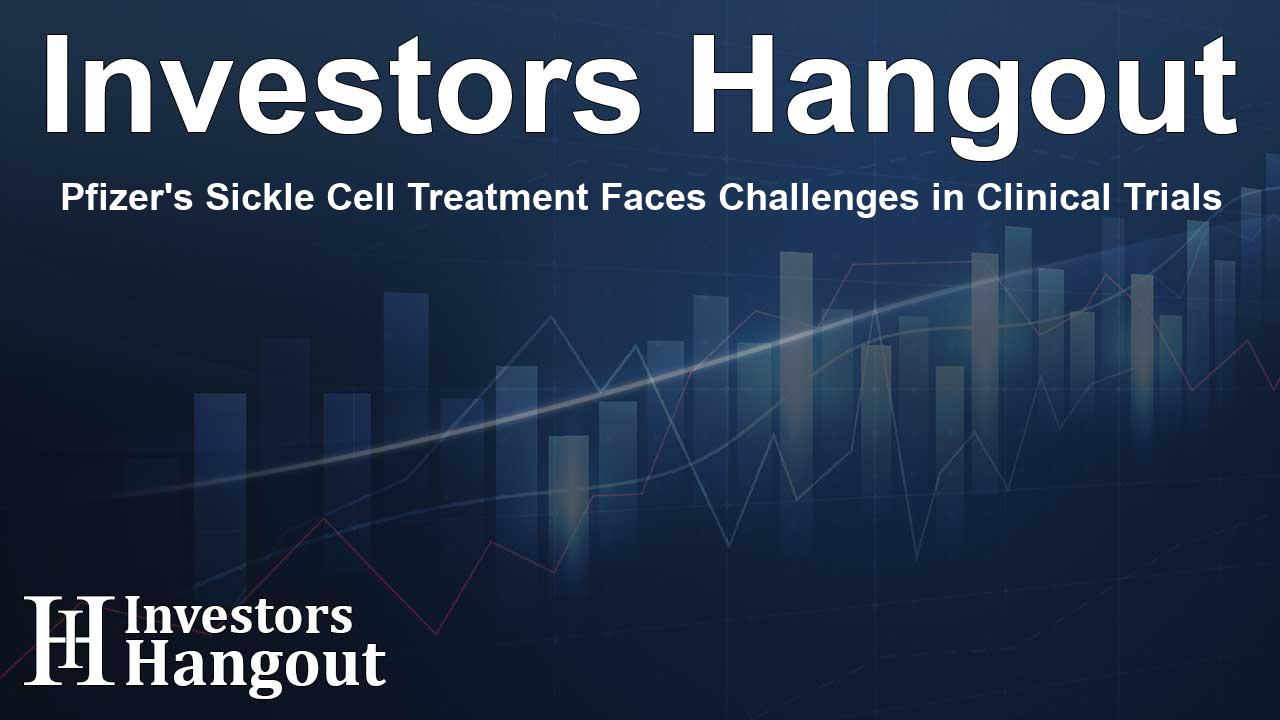Pfizer's Sickle Cell Treatment Faces Challenges in Clinical Trials

Update on Investigational Drug for Sickle Cell Disease
Pfizer Inc. (PFE) recently announced significant results from its Phase 3 THRIVE-131 study. This trial evaluated inclacumab, a promising P-selectin inhibitor, targeting individuals aged 16 and over suffering from sickle cell disease.
Understanding Sickle Cell Disease
Sickle cell disease consists of a collection of inherited disorders affecting red blood cells, which are crucial for transporting oxygen throughout the body. Affected individuals often experience severe pain due to the abnormal shape of these cells, which become rigid and sickle-shaped, leading to blocked blood flow and subsequent organ damage.
Trial Outcomes and Implications
Unfortunately, THRIVE-131 did not meet its primary endpoint; the reduction in vaso-occlusive crises (VOCs) in participants receiving inclacumab compared to those on placebo could not be established over a 48-week period. These results highlight the complexities of treating such a challenging disease.
Safety and Tolerability of Inclacumab
While inclacumab was generally well-tolerated throughout the trial, common treatment-emergent adverse events included anemia, arthralgia, back pain, headache, malaria, and upper respiratory tract infections. These findings emphasize the importance of continuously monitoring safety and effectiveness in clinical settings.
Continued Development in Sickle Cell Treatments
Despite this setback, Pfizer remains committed to advancing its portfolio for sickle cell disease. The company is actively working on alternative treatments such as Oxbryta (voxelotor) and osivelotor. Pfizer has promised to keep stakeholders updated as new information becomes available regarding these treatments.
Withdrawal of Oxbryta from the Market
In a significant move, Pfizer announced a voluntary withdrawal of all Oxbryta (voxelotor) lots for treating sickle cell disease from global markets. This decision, made in September, stemmed from accumulating clinical data suggesting that Oxbryta's overall benefits are overshadowed by its risks in the approved patient demographic.
Collaborations and Market Developments
Other companies are also innovating in the sickle cell space. Earlier this year, IMMvention Therapeutix Inc. forged a collaborative agreement with Novo Nordisk A/S (NVO) to develop oral therapies for sickle cell disease and various chronic conditions. This partnership aims to leverage IMMvention’s investigational small-molecule BACH1 inhibitors.
Innovative Developments by Beam Therapeutics
Recently, Beam Therapeutics Inc. (BEAM) revealed promising new data from their BEACON Phase 1/2 trial of BEAM-101, which targets patients suffering from severe vaso-occlusive crises. Their updated data showed substantial increases in fetal hemoglobin levels and other significant hematological improvements, indicating a potentially effective approach for treating sickle cell disease.
Current Market Implications
In terms of stock performance, Pfizer's shares recently showed a modest increase of 0.24%, landing at $25.17 per share. Despite the challenges faced with inclacumab, the ongoing developments in Pfizer's pipeline reflect a determined approach to addressing the needs of those with sickle cell disease.
Frequently Asked Questions
What challenges did Pfizer face during the trial?
The THRIVE-131 study did not meet its primary endpoint of significantly reducing vaso-occlusive crises in participants treated with inclacumab compared to placebo.
What is the status of Oxbryta?
Pfizer has withdrawn Oxbryta from global markets due to clinical data indicating its risks outweigh its benefits in the intended patient population.
What other companies are working on sickle cell treatments?
IMMvention Therapeutix and Novo Nordisk have partnered to develop new therapies, while Beam Therapeutics is advancing base-editing therapies.
How did inclacumab perform regarding safety?
Inclacumab was generally well-tolerated, though it was associated with some adverse effects, including anemia and headaches.
What are Pfizer's next steps after these trial results?
Pfizer continues to explore other options in its sickle cell treatment portfolio and will provide updates as new data becomes available.
About The Author
Contact Owen Jenkins privately here. Or send an email with ATTN: Owen Jenkins as the subject to contact@investorshangout.com.
About Investors Hangout
Investors Hangout is a leading online stock forum for financial discussion and learning, offering a wide range of free tools and resources. It draws in traders of all levels, who exchange market knowledge, investigate trading tactics, and keep an eye on industry developments in real time. Featuring financial articles, stock message boards, quotes, charts, company profiles, and live news updates. Through cooperative learning and a wealth of informational resources, it helps users from novices creating their first portfolios to experts honing their techniques. Join Investors Hangout today: https://investorshangout.com/
The content of this article is based on factual, publicly available information and does not represent legal, financial, or investment advice. Investors Hangout does not offer financial advice, and the author is not a licensed financial advisor. Consult a qualified advisor before making any financial or investment decisions based on this article. This article should not be considered advice to purchase, sell, or hold any securities or other investments. If any of the material provided here is inaccurate, please contact us for corrections.
